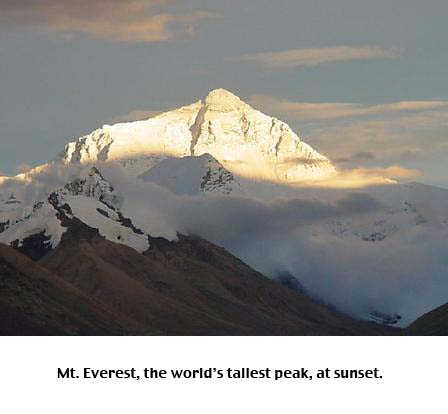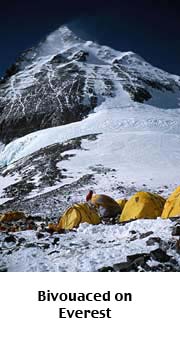
A few weeks ago, a few friends and I decided to attempt a dangerous wintertime ascent of Mt. Tamalpais, in California's rugged western Marin County highlands. It was a feat that only the bravest, or most foolhardy, of souls would dare undertake, as the mountain that men call "that hill over there" is a veritable graveyard of broken dreams. During the day, temperatures on "Mt. Tam" can easily dip into the mid-fifties, and the inhuman, biting winds can blister a man's lips so raw that—if he's lucky enough to make it back down alive—a walnut-Gorgonzola salad back in Sausalito can almost hurt to eat, if not washed down with a decent zinfandel.
Some will ask: why do it? Why take the risk? Why confront nature at her most mildly irritated? After all, we all had friends and family—why put them through the hell of wondering whether we would have the car back in time for them to go antique shopping? Why challenge ourselves against the modestly discomforting?
Well, for one thing, there were no good games on.
An expedition like this leaves no margin for error. The slightest lapse in preparation can mean the difference between returning home safely and returning home safely but with a big blister on the back of one's heel. Accordingly, our group—originally five brave souls, but later tragically reduced to four when a babysitter could not be found—cut no corners in preparing for our ordeal. Minute after endless minute was spent in putting on sweaters, turning off home heaters, and finding maps in glove compartments. Finally, after what seemed like an eternity, we found ourselves at the base of the mountain that local Indians call "that big rise near the radio towers."
We began to climb. At first, things seemed to go well. Our supplies of Clif Bars were not attacked by rats, and none of the locals came at us with sharpened spears, although one man did approach us to ask if we knew where he could get some fresh avocados. But we had scarcely made our first checkpoint when potential disaster struck: suddenly, without warning, our radio picked up a Heavy Metal station out of Santa Rosa, and we were faced with a grim decision: switch off the car radio, or listen to Pantera all the way to the top.
I flicked the radio off.
I know that I will be second-guessed for this decision. I know there are those who, reviewing the tragic history of our expedition, will look at this choice and say, "There—that is when it all unraveled." To which I say: You weren't there. You don't know what it was like. It's easy to sit back in your armchairs and listen to McCoy Tyner or Norah Jones and say what you would or would not have done, but until you've been in a Honda Civic with a carful of Twisted Sister, I say, you just don't know.
Still, despite this setback, we continued to climb, keeping a wary eye out for ice crevices and potential snow avalanches. Because this area so seldom gets snow, avalanches are especially easy to overlook. Nonetheless, after almost a half an hour of driving, we reached Base Camp Alpha—the Main Parking Lot of the East Summit.
We were a wreck. Grape juice had spilled down the front of one climber's shirt, while another's shoelace had snapped in two like a baby's frozen arm in a paint factory. One of our Clif Bars had fallen down between the car seats, leaving us only 6 bars for the nearly half-mile hike to the summit. Worst of all, the weather forecast called for heavy rain, thunder, and lightning. It was not until we returned home that we realized that this was a weather forecast for Cody, Wyoming.
Undaunted, we set off, pausing only to make last-minute provisions of redwood-burl keychains at the summit gift shop. The wind was swirling like a drunken quadraplegic by now, and we felt the bitter cold on our exposed kneecaps as we began the final assault on the mountain that local Japanese oyster fishermen call "the bumpy ridge near the guest lodge."
To this day, I believe that if our luck had been just a little better, we would have made it.
Night falls quickly in that part of the world, and we knew that we had only a scant eight hours before dusk would begin to creep in. That meant that if we took three hours to cover the remaining quarter-mile up the steps to the top, and three hours to get back, we would have only two hours to spend at the top, playing backgammon and eating our sandwiches. We decided to forego the side trip to Namibia and concentrate on making it up and back in one day—a decision that later proved completely sound.
About 400 feet short of the end of the wooden planks, in high good spirits despite our setbacks, we encountered what I can only describe as tragic bad luck. Just as our lead climber began a dangerous move known in hiking circles as "cracking the jack" or "going up to the next level of steps," a crazed Welsh Corgi, somehow unleashed by its owner, lunged at him (or, possibly, at a piece of discarded lunch meat near him—we will never know), causing him to step backwards onto the toe of the hiker behind. The second hiker immediately let out a small cry of pain, and that's where the panic set in.

In retrospect, would I do anything different? Yes and no. I probably wouldn't have ordered the calamari for brunch beforehand, because that stuff sits in your stomach and makes you "hike heavy." And I probably wouldn't have taken along the ice-axes and crampons, because they totally crushed the peanut-butter sandwiches.
But none of us—none—ever considered, even for a moment, calling off the hike. There was simply too much at stake. Pride. Self-respect. Breaking in new Timberlands. Sure, if I had known beforehand how things would turn out, I might have suggested something easier, like climbing the jungle gym at the Park Merced rec center. But you never know how these things will turn out until you try.
Hemingway famously defined courage as "Grace under pressure." And I think that's very accurate. Because, on the way home, we all dog-piled on Grace in the Denny's booth, and that's very courageous, because Grace likes to pinch.